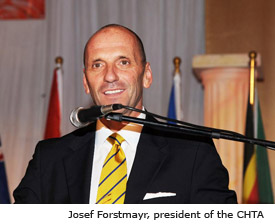by Mark Rogers
In a social media world, it’s still important to find time to get out from behind our monitors and away from our devices to press the flesh with real people. All the better if you can do this in the Bahamas, where the 30th edition of Caribbean Travel Marketplace was recently held. The Caribbean Hotel & Tourism Association (CHTA) held the business-to-business marketing event at the Atlantis, Paradise Island. The three-day event was a swirl of deals, pronouncements, hunches and revelations.
Alec Sanguinetti, CEO and director general, CHTA, set the tone early with his observation, “When business is challenged, serious people come out to do business.”
Caribbean Travel Marketplace saw a 17 percent increase over 2011 in buyer companies with 142 in attendance, as well as an increase in buyer delegates which totaled 344 versus 314 in 2011.
A lot of the buzz on the trade floor was about the growth of the Latin American market and the supportive new routes from Copa Airlines; as well as the rise of the Russian market. To give some perspective to the increased Russian presence, there were 11 buyer companies from Russia – the same number as companies from the UK.
What this means for marketing the Caribbean in the United States remains to be seen. The U.S. is still by far the major market for the region, and it’s a safe bet that the U.S. will remain front and center of any major marketing push.
During marketplace, Josef Forstmayr, president of the CHTA, remarked, “The Caribbean remains the most tourism dependent region in the world.” To that end, Forstmayr has crafted a “Tourism is Key” message that hits the following points: Travel and tourism directly and indirectly employs 2.2 million people in the Caribbean (1 in every 8 jobs); and travel and tourism accounts for 14.2 percent of the Caribbean’s economic activity.
“(Travel and tourism) is the fastest way to create jobs, grow the economy and generate income for all,” said Forstmayr. “Every citizen needs to understand that, whether or not he or she works directly in the tourism areas, every tourist's dollar brings economic and social benefits to every level of our society."
Forstmayr also brought up the sputtering performance of intra-Caribbean tourism, which once represented 13 percent of the region’s tourism. He railed against the region’s lack of a competitive regional airline, inflated ticket prices and the aggravation of visas, long immigration lines and bureaucratic red tape.
Unfortunately, this is a complaint we hear year after year from the Caribbean’s leaders in travel. For example, the Bahamas has a wonderful, newly-renovated international airport in Nassau. Even so, a hotelier from Tobago attending marketplace was on my Miami return flight, forced to first fly to Miami to catch a flight home to Tobago. A waste of time; a waste of money. Perhaps the argument for intra-regional travel has to be couched in terms of lost business; maybe then it will sink in.
One of Forstmayr’s strengths is his capacity for straight talk, for instance, his observation about the Caribbean and its way of tackling change: “When you have a problem, you don’t look at the problem – instead you look at your neighbor and blame them.”
Another crystal clear comment from Forstmayr: “Latin American countries are the future for the Caribbean.”
And this one, in response to the controversial Air Passenger Duty out of the UK: “People hate to spend money on airline tickets.”
During the conference, Vincent Vanderpool-Wallace, Bahamas minister of tourism, reiterated Forstmayr’s view of air travel, when he said, “Nothing stimulates travel to a destination more than low cost, high quality, high frequency air connections. The Bahamas has fifty government owned and operated regional airports and fifteen international airports.”
The Bahamas backed up this view with a successful Companion Fly Free campaign in 2010 and 2011. According to Vanderpool-Wallace, the campaign was essentially geared to spark more travel from the mid-budget market. Hopefully the Bahamas will see fit to offer the campaign for a third year.
Later this year, the Bahamas will also begin marketing 16 separate island groups within the island chain. Each will have their own logo, and will be heralded as a multiple-destination experience within one destination, with each island group having its own unique culture and appeal.
With all of the sizzle surrounding Latin America, it’s important to remember that MLT Vacations continues to be a great resource for travel agents in the U.S. selling the Caribbean. In 2011, MLT Vacations grew business in the Caribbean by over 46 percent from last year. They’ve launched a Caribbean sale offering up to 10,000 bonus miles per person and reduced rates or additional amenities at select resorts throughout the Caribbean through their Delta Vacations and United Vacations brands. If you want to take advantage of the offer, you’ll have to move fast - the sale is open for bookings through Feb. 18 and is valid for travel April 1 – Sept. 30, 2012. Through Delta Vacations, travelers will find additional service via Delta Air Lines from New York (JFK) to San Juan, Puerto Rico, and Santo Domingo, Dominican Republic as well as additional service from New York (LGA) to Nassau, Bahamas. Through United Vacations customers have access to one stop shopping with the expanded route network of Continental Airlines and United Airlines flights to the Caribbean from the United States and Canada.
Caribbean Hotel & Tourism Association
www.caribbeanhotelandtourism.com |